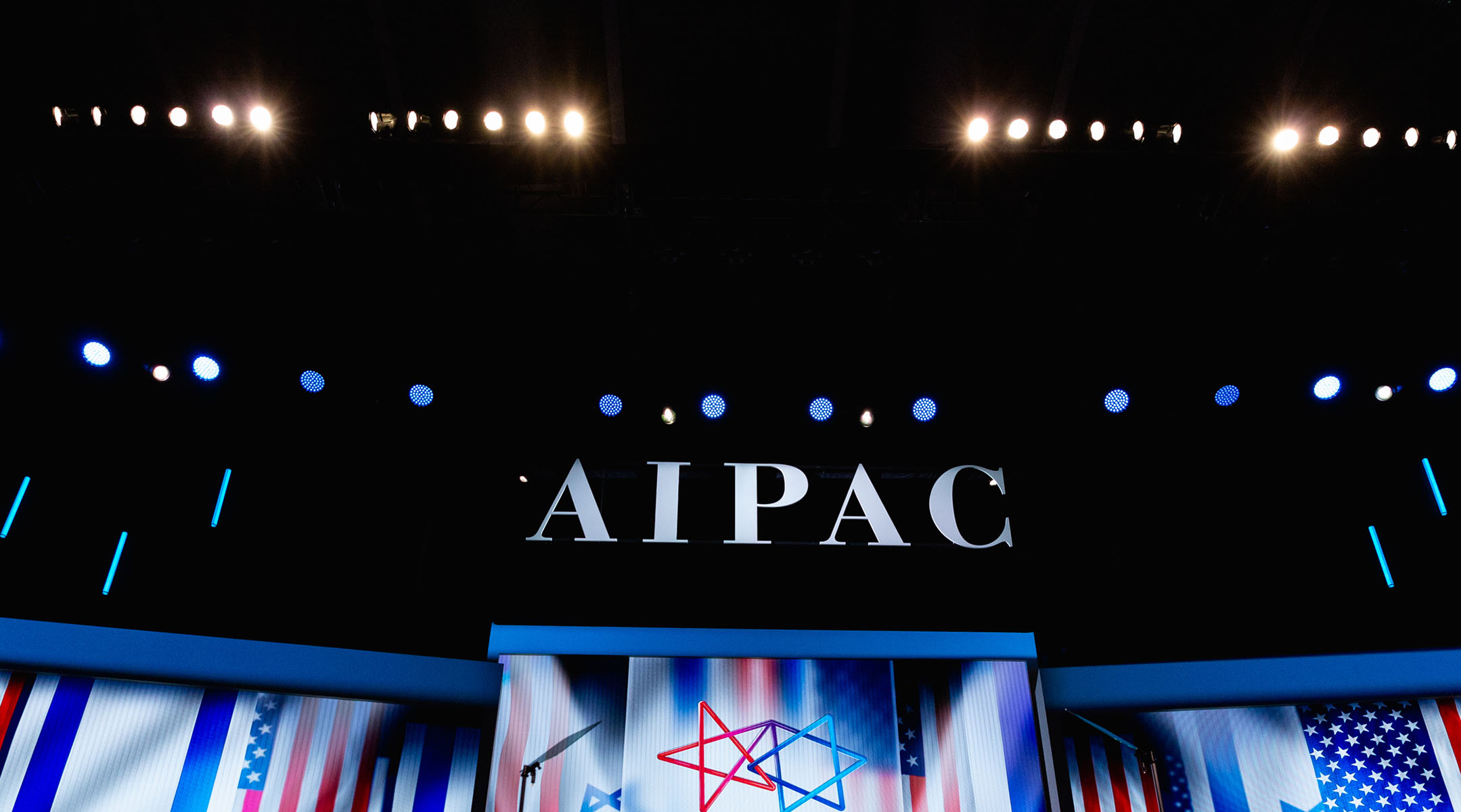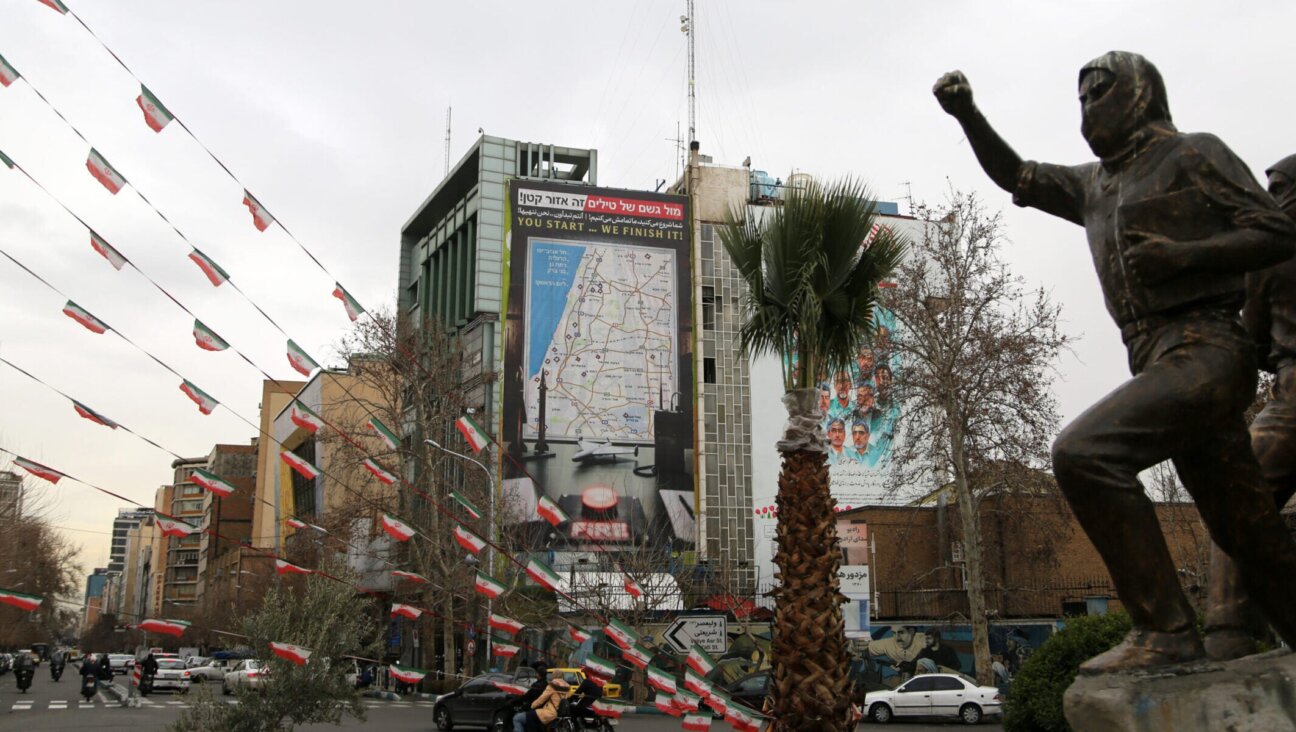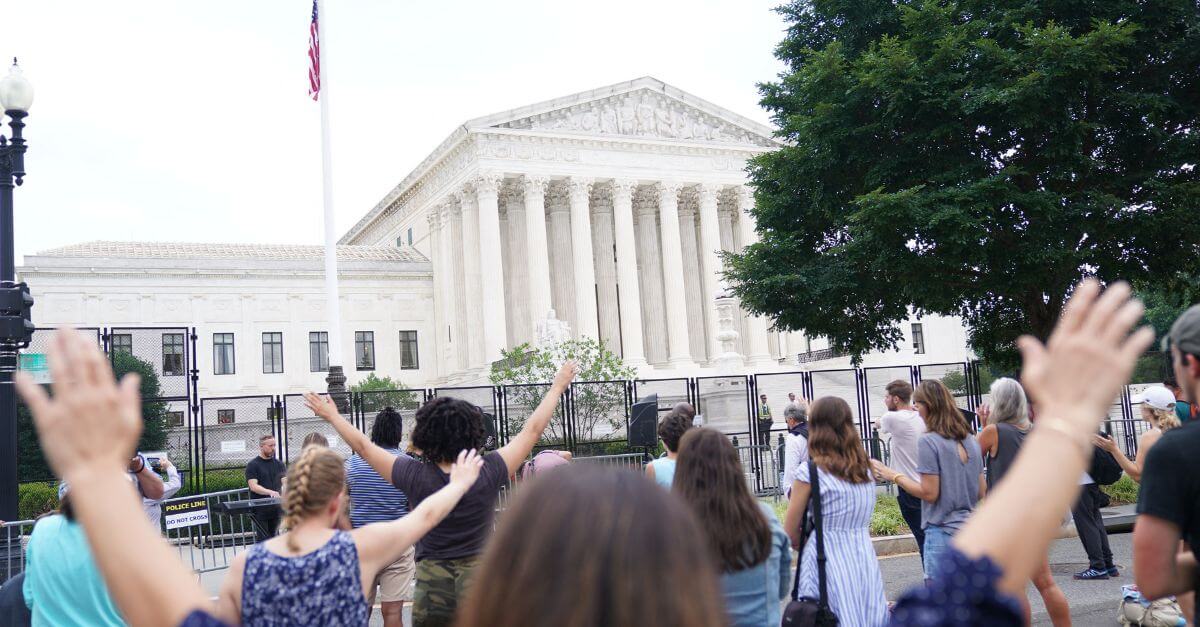AIPAC’s huge investment in primary campaigns is paying off — but at what price down the road?
The outsized spending has the potential to roil a number of longstanding orthodoxies, not just about pro-Israel politics, but elections in general

A view of the stage at the 2019 AIPAC conference in Washington, D.C. Photo by Cheriss May/Nur via Getty Images
WASHINGTON (JTA) — AIPAC believes it’s getting bang for its buck. Big time.
As of this month, the United Democracy Project, one of the two political action committees AIPAC established last December, is the biggest-spending nonpartisan political committee and the second-largest overall this cycle, dispensing more than $26 million on its favored candidates.
The results: Out of nine candidates backed by UDP, a super PAC allowed to spend unconditionally as long as it does not coordinate with a campaign, six have won their primaries and one has lost. Polling suggests one more likely win out of the two races left that the group is invested in, next week in Michigan.
Meanwhile, an affiliated conventional PAC — the AIPAC PAC — raised close to $12 million by the end of last month, and of the 212 of its candidates that have faced primaries to date, 207 have won.
“It has become crystal clear that being anti-Israel will have a negative effect on a candidacy,” Patrick Dorton, a spokesman for UDP, the super PAC, said in an interview.
The two PACs “have already had a significant impact, and they have helped to underscore that it is both good policy and good politics to support the U.S.-Israel relationship,” said Marshall Wittmann, a spokesman for AIPAC and its AIPAC PAC.
Message sent. But the outsized spending has the potential to roil a number of longstanding orthodoxies, not just about pro-Israel politics, but elections in general.
Spending by UDP has made Israel, an issue few Americans are invested in, a front and center electoral issue in major races. AIPAC hopes to once again narrow a definition of pro-Israel that liberal groups like J Street have succeeded in expanding in the last 15 years. And, with UDP’s focus only on Democratic primaries, the super PAC appears to be proving that a single-issue group is capable of shaping a party to its preferred contours.
The spending has bewildered political veterans and thrust Israel issues into the fore in places and races where there would likely otherwise be little interest.
“Never in Detroit ever have I seen it,” Jonathan Kinloch, who chairs the Democratic Party in Michigan’s 13th District, one of two in the state where UDP has spent millions on primaries taking place next week, told The Detroit News this week. “I’ve been involved since the early 1980s as a teenager. I’ve never seen in Detroit a congressional race having this kind of outside money.”
In May, The Assembly, a North Carolina magazine, headlined its deep dive into UDP’s spending in its state “Buying a Blue Seat.”
Until a year ago, the pro-Israel powerhouse was at pains to explain that it was not, in fact, a PAC. The PAC in its name stood for Public Affairs Committee, and AIPAC did not involve itself directly in elections.
AIPAC’s annual policy conferences were at pains to present as welcoming one and all — roll calls at the massive Monday night dinner named congressional guests that included critics of Israel. Lay leaders sternly reminded activists never to boo anyone who had crossed the lobby, and to always make their case without rancor. The lobby was about suasion, and not alienation, at least ostensibly.
Behind the scenes, AIPAC could be ruthless, burying legislative initiatives that were even moderately critical of Israel. And while AIPAC did not directly involve itself in elections, it encouraged its donors to do so. There were big givers to both parties who were unmistakably identified with the lobby, among them Haim Saban, the Israeli American entertainment mogul who backs Democrats, and Sheldon Adelson, the late casino billionaire and GOP giver who had a close relationship with AIPAC until a split in 2007.
Still, maintaining at least a superficial distance from partisan attacks served AIPAC well for decades. But Dorton explained that the shifting political landscape necessitated a direct entry into the fray.
For one thing, political winds change much faster than in the past, and relying on others to shift donor attention to an election AIPAC deemed critical was not cutting it anymore. UDP made AIPAC more nimble, Dorton said.
“There are short windows in these races, and it’s important to get a message out, and in a matter of weeks,” he said.
Another factor is the growing influence of an Israel-critical wing among progressives in the Democratic Party. A small but vocal number of left-wing Democrats in Congress briefly held up a vote on defense assistance for Israel last year after the country’s conflict with Hamas in Gaza, a public display that once would have been unthinkable after scenes of Israelis running for shelter. Insiders say progressives are slow-walking approval for defense expenditures through Congress and subjecting the demands to increased scrutiny.
Keeping Democrats on board with AIPAC’s agenda is critical to its bipartisan ethos, Dorton stressed.
“There was rising concern in the pro-Israel community about candidates for Congress who held radical anti-Israel views,” Dorton said. “What we’re trying to do is build the broadest bipartisan pro-Israel coalition in Congress possible.”
Wittmann, the AIPAC PAC spokesman, said the PACs helped foster clarity. “The PACs have highlighted who are the pro-Israel candidates and who are detractors of Israel.”
J Street, a liberal Jewish Middle East policy group launched in 2008 as a counterweight to AIPAC to create space for what it describes as policies that are pro-Israel while at times critical of its government, says that while the short-term results may validate AIPAC’s gambit and keep Democrats in line, long term it will have lasting damage.
Logan Bayroff, the group’s vice president of communications, said the heavy-handed spending would alienate Democrats and Americans who will identify AIPAC and the pro-Israel community with bullying.
“Somehow, they expect at the end of the day that all this is going to somehow strengthen support for Israel,” Bayroff said. “I think this is an admission that they can’t win on the merits.”
In some cases, the spending has alienated local politicians who resent out-of-state bigfooting. In North Carolina, Marcia Morey, an influential state representative who otherwise does not have a record on Israel, withdrew her support for Valerie Foushee, a congressional candidate, because of what she called “massive out-of-state donations” from AIPAC’s allied PACs on Foushee’s behalf.
Dorton said the spread of anti-Israel sentiment necessitated the bolder approach.
“The reality is that those radical anti-Israel views have seeped over the last several years into politics in a way that threatens the historic and bipartisan support for Israel in Congress,” he said. “We feel it’s necessary to highlight the contrasts between candidates. These are important races.”
Some of the candidates UDP has opposed have not been pronouncedly critical of Israel. In a Texas race in which UDP backed incumbent Henry Cuellar, his challenger, Jessica Cisneros, has little to no record on the issue, and foreign policy didn’t feature on her campaign website, though she had been endorsed by J Street this year and in 2020, when she came close to unseating Cuellar, who opposes abortion rights and gun control measures. Cuellar edged out Cisneros last month.
In other cases, UDP is not targeting some of the most prominent Israel critics in the House, such as Ilhan Omar and Betty McCollum of Minnesota and Rashida Tlaib of Michigan.
Dorton said the PAC’s decisions were strategic: It’s hard to oust incumbents, and it was more important to keep anti-Israel primary candidates from gaining incumbency.
“Part of it is evaluating a viable pro-Israel candidate versus a potential anti-Israel ‘Squad’ type,” he said, referring to Tlaib and the small group of other progressive Democrats who push for forceful U.S. pressure on Israel, including withholding aid.
Mark Mellman, the president of the Democratic Majority for Israel PAC, which like the AIPAC-affiliated PACs has also promoted traditionally pro-Israel candidates, said there was no reason to throw good money away.
“We want to be in races where we can make a difference,” said Mellman, whose group has spent over $6 million on primary races and has so far scored 35 wins and six losses. “There are some races where somebody’s going to win, somebody’s going to lose, and there’s nothing you can do about it.”
J Street’s Bayroff said he perceived the aim of the AIPAC-affiliated PACs as narrowing pro-Israel discourse to the uncritical dimensions that flourished prior to the rise of J Street. He noted that UDP was spending millions in a Michigan race pitting two Democratic incumbents against one another because of redistricting. Pro-AIPAC groups are backing Rep. Haley Stevens and opposed the J Street-endorsed candidate, Rep. Andy Levin, a scion of a Jewish political family who is an outspoken promoter of U.S. involvement in nudging Israel and the Palestinians toward a two-state outcome.
“They’re making this an extra-polarizing issue,” Bayroff said. “They seem eager to try to make this a divide.”
David Victor, a past AIPAC president who lives in the Detroit area, said earlier this year in an email that was leaked to Levin backers that Levin’s credentials are what makes him dangerous; his ostensible moderation gives cover to radicals like Tlaib, he said.
“Andy sincerely claims to be a lifelong Zionist, proud Jew and defender of Israel,” Victor said in the email. “So when Andy Levin insists he’s pro-Israel, less engaged Democratic colleagues may take him at his word.”
AIPAC, now that its affiliated PACs are in the race, is also susceptible to perceptions about its associations.
A number of Democrats have attacked the PACs for taking money from Republicans, and in the case of AIPAC PAC, for endorsing dozens of Republicans who voted not to certify Joe Biden’s election as president even after former President Donald Trump spurred a deadly insurrection at the Capitol. In a Michigan race, one of UDP’s donors is a Republican industrialist, Edward Levy, who is funneling money through UDP to Adam Hollier, a state senator who backs an initiative that would open up a gravel mining opportunity for Levy.
Bayroff said the net effect was that AIPAC appeared to be backing insurrectionists while taking on progressives. J Street’s president, Jeremy Ben Ami, has said the perception is that AIPAC is doing battle with people of color.
Dorton ridiculed the notion, noting that UDP had backed progressives and that most of the candidates AIPAC endorses were people of color. He said the mix of Republicans and Democrats showed unity of purpose.
“These individuals are completely putting aside their partisan agendas to support candidates that are pro-Israel,” he said.
Notably, however, Dorton did not commit UDP to backing its Democratic primary winners in the general election against Republicans who might be equally or even more aligned with AIPAC’s agenda. (Wittmann said AIPAC PAC would support its endorsees throughout the cycle.)
“We’re looking carefully at races and opportunities to expand the bipartisan pro-Israel majority,” was all Dorton would say about November.
If UDP sticks with the Democrats it backed in the primaries, it could put AIPAC in the fraught position of backing one candidate who favors the group’s Israel policies against another.
Mellman said that’s why direct pro-Israel involvement in elections should come from within the party, and not an ostensibly neutral PAC.
“To the extent there’s a problem [about Israel] within the Democratic Party, it’s only going to be solved by Democrats working within the Democratic Party,” he said.
This article originally appeared on JTA.org.

















